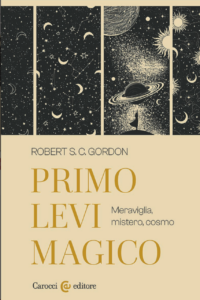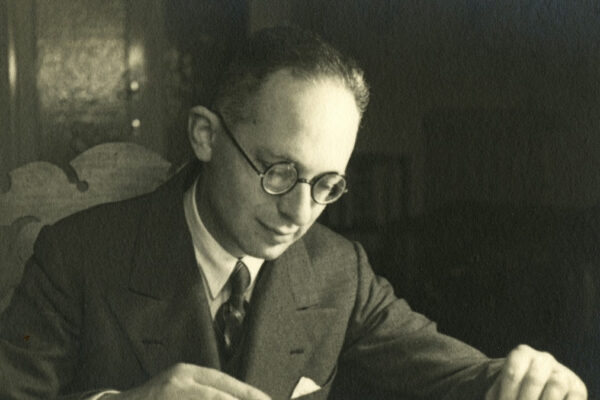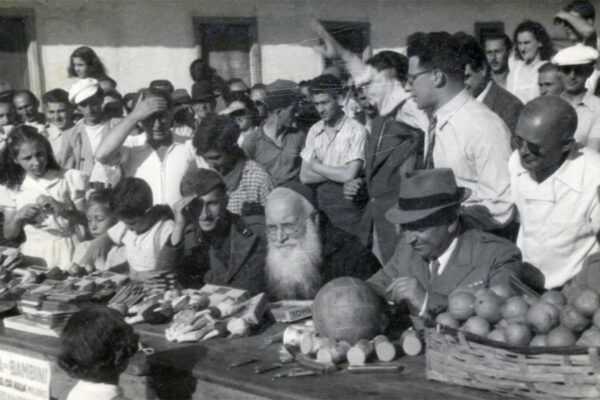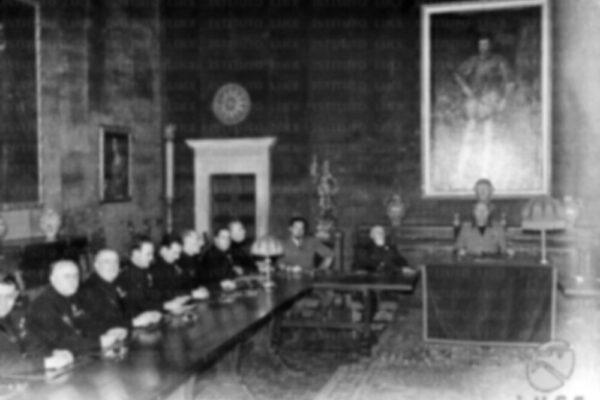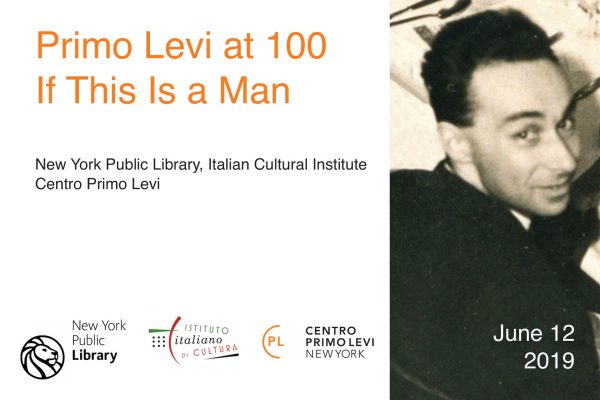A new book explores Levi’s capacity to combine the cognitive power of science with religion’s forces of enchantment and ritual.
Marco Belpoliti is a literary critic, novelist, editor and cultural organizer. He edited Primo Levi’s complete works for Einaudi, and has helped define Levi’s critical reception among scholars and the general public. He teaches at the University of Bergamo. Among his works L’occhio di Calvino (Einaudi 1996), Settanta (Einaudi 2001), Il corpo del Capo (Guanda 2009), Pasolini in salsa piccante (Guanda 2010), Camera straniera. Alberto Giacometti e lo spazio (Johan & Levi 2012), L’età dell’estremismo (Guanda 2014), and, available in English, Primo Levi: An Identikit (Seagull Books 2022). He directs the magazine “Riga” with Elio Grazioli, and collaborates with “La Repubblica” and “L’Espresso”.
Robert Gordon, is Serena Professor of Italian Studies at the University of Cambridge. He works on 20th-century Italian literature, cinema and cultural history, and on Holocaust studies. Among his studies on Primo Levi and the Shoah: The Holocaust in Italian Culture (Stanford University Press, 2012) and, Primo Levi’s Ordinary Virtues: From Testimony to Ethics (Oxford University Press, 2001), and Outrageous Fortune–Luck and the Holocaust (Einaudi/Centro Primo Levi Editions, 2011) He is also the author of Pasolini. Forms of Subjectivity (Clarendon Press, 1996), Bicycle Thieves (Bloomsbury, 2008) and an essay on the role of luck in modern fiction, Modern Luck (UCL Press, 2023).
Whoever said that a book must be long and weighty in order to say something important, maybe even something new? On occasion, just a few pages are all that is required to transform the interpretation of a theme or of an author whose work has been analyzed countless times. Primo Levi magico (A Magical Primo Levi, Carocci, 2024) by Robert Gordon, Professor of Italian Studies at Cambridge, is a case in point; a book of little more than 100 pages that contains some important new reflections on this writer who is among the most widely read and admired of our time.
According to Gordon, as his title suggests, there is a ‘magical’ Primo Levi, where the adjective ‘magical’ refers not so much, or not only, to specific forms of arcane belief, but rather to a deep stratum of thought and knowledge in Levi, which has the capacity to combine the cognitive power of science with forces of enchantment and ritual characteristic of religion. This dimension is, Gordon explains, an imaginative synthesis that conjoins the sphere of literary creativity with a simultaneous and quite specific anthropological conception of human experience. In other words, it is impossible to understand Levi’s work fully through its scientific aspect alone, through its chemistry and its Enlightenment values alone; we also need to read him through aspects that can be defined as irrational, which the author of this book delimits in a triad of linked terms: wonder, mystery and, precisely, magic.
It would be enough to read just a few pages of La ricerca delle radici (The Search for Roots), one of Levi’s most important but also one of his least well-known books, to realize that this anthology of texts collected and presented by Levi at the request of his publisher, Giulio Einaudi, includes a rich series of ‘magical’ names and works, mythical and religious texts, together with its scientific and science-fiction extracts, its literary passages and its anthropological notions. Gordon’s provocation has the merit not only of showing us the relationship between the rational and the irrational in the author of If This is a Man, from this unprecedented and original angle but also of pointing out how a form of ‘magical thinking’ is at work throughout the Turinese writer’s entire oeuvre, without him ever coming to embrace any form of mysticism or of magic tout court.
As a young chemist, Levi was used to questioning the “mystery” of the material world through science, only then to find himself plunged into the most absurd and irrational site of modernity, the extermination camp. He emerged from it by drawing on mental resources that necessarily refused to exclude a priori the dimension of the unpredictable, stochastic. For Levi, as he notes in the first line of his first book, luck played a fundamental role in his survival. Not providence, not a divine plan, as a friend would later tell him, but precisely the mysterious and unpredictable element that is present in all our lives, the same luck that plays a significant role in all scientific endeavors. Gordon reminds us that even Levi’s rational vocation had been born of a desire to unravel the arcane aspects of chemistry: “We would be chemists, Enrico and I. We would dredge the belly of mystery with our powers, our genius” (The Periodic Table).
Gordon shows us, through an array of examples from Levi’s work, how the presence of magic constitutes a form of thinking that is ‘other’, distinct from that of conventional science. There are poems, short stories, passages of narrative, and essays that convince us that the chemist from Turin never relies exclusively on the positivistic certainties of science, even though this never led him to cede to mystical or religious revelations, as was the case with some other writers and philosophers who passed through the trauma of Auschwitz. The importance of this small volume, then, consists in underscoring how apparently ancillary features of Levi’s sensitivity to the unknown or to the mysterious are deeply connected to the most incomprehensible and undefinable problems of the concentration camp experience.
An illustration of this is provided by the string of the most indecipherable characters he encounters in the ‘concentration camp universe’ (and beyond), characters he labels, using a striking and unusual adjective, as “scalenes.” These are the tricksters, the scoundrels, the madmen, the inventors, the mystics, and the healers. Levi often shows an intense curiosity towards these figures, even those he self-evidently condemns in moral terms, in a way that goes well beyond the confines of the rational where his scientific formation would normally place him. Even if Gordon does not say so openly, his Judaism itself – an element Levi is consistently alert to, even though he only rarely places it at the heart of his writing – predisposed him to capture these irrational forms of the struggle for life, in a place where every vital act was bound to chance and fortune on the one hand, and to the capacity of individuals to create and invent solutions, on the other. Levi, the chemist, admires, is fascinated by, and at times is even envious “in the face of these figures of pure freedom and creativity” who renew and reprise in their own small way the original myth of the divine Creation of Genesis.
For those who do not recall or do not know at all the character of Dr. Gottlieb from The Truce, open up that book once again and read the few lines Levi dedicates to him there, quoted by Gordon. You will encounter the compelling and mysterious figure of the thaumaturge, a worker of wonders to whom young dott. Levi owed something priceless and unique, something magical: life itself.



